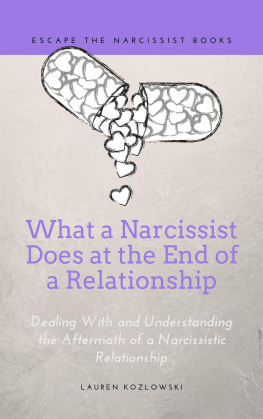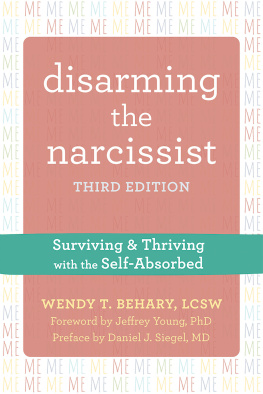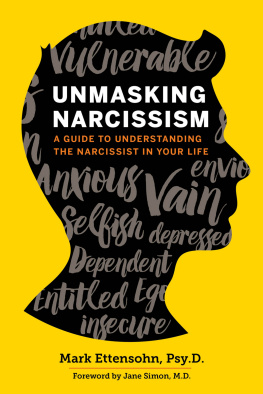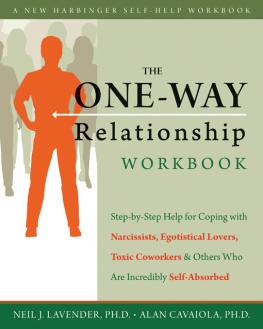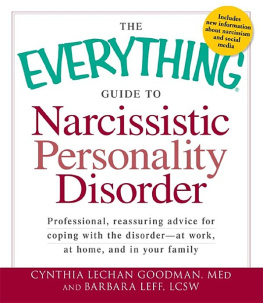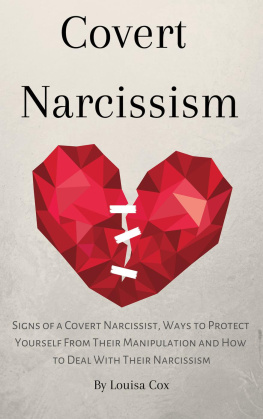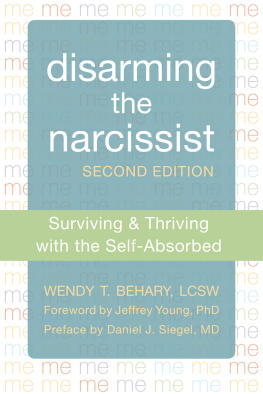Lavender and Cavaiola have produced a workbook that guides the reader in self-exploration and suggests ways to maintain positive self-esteem when in relationships with difficult people. The authors present easy-to-understand definitions, descriptions, and activities focused on essentials that help the reader.
Nina W. Brown, Ed.D., LPC, NCC, FAGPA, professor and eminent scholar at Old Dominion University in Norfolk, VA
This practical and perceptive workbook does more than just educate readersit will help them transform their relationships.
Randi Kreger, coauthor of Stop Walking on Eggshells and The Stop Walking on Eggshells Workbook

Publishers Note
This publication is designed to provide accurate and authoritative information in regard to the subject matter covered. It is sold with the understanding that the publisher is not engaged in rendering psychological, financial, legal, or other professional services. If expert assistance or counseling is needed, the services of a competent professional should be sought.
Distributed in Canada by Raincoast Books
Copyright 2010 by Neil J. Lavender and Alan Cavaiola
New Harbinger Publications, Inc.
5674 Shattuck Avenue
Oakland, CA 94609
www.newharbinger.com
All Rights Reserved
Printed in the United States of America
Acquired by Jess OBrien; Cover design by Amy Shoup; Edited by Brady Kahn; Text design by Tracy Carlson
ePub ISBN: 978-1-60882-205-8
The Library of Congress has cataloged other formats of this work as:
Lavender, Neil J.
The one-way relationship workbook : step-by-step help for coping with narcissists, egotistical lovers, toxic coworkers, and others who are incredibly self-absorbed / Neil J. Lavender and Alan Cavaiola.
p. cm.
Includes bibliographical references.
ISBN 978-1-57224-909-7 (pbk.) -- ISBN 978-1-57224-910-3 (pdf ebook) 1. Narcissism. 2. Interpersonal relations. 3. Interpersonal conflict. I. Cavaiola, Alan A. II. Title.
BF575.N35.L39 2010
158.2--dc22
2010043968
We dedicate this book to our wives, a couple of wonderful Irish gals:
To Carolann, for all your love, support, and encouragement.
To Maureen. You are the joy in my life! Thank you for all the ways you love me.
We also dedicate this book to all those who struggle daily in one-way relationships. Its never too late to make changes. May you find peace, serenity, and wholeness in all of your relationships.
Acknowledgments
We would like to acknowledge all of our mentors at New Harbinger who have made this workbook possible. We are especially grateful to Jess OBrien for his patience and support throughout this project and to Jess Beebe for her editorial expertise. You both helped us to communicate clearly and concisely. And a special thanks to Brady Kahn; your suggestions were spot-on. We appreciate all the work you put into this project. We also want to thank the entire New Harbinger staff. Youve been wonderful to work with.
Also, to those psychologists and researchers who continue to shed light on the evolving topic of personality disorders, we hope and pray that your work will continue to bring healing to those who suffer in loneliness due to lack of knowledge.
We would like to thank our families for their support, especially our lovely wives and golf buddies and our kids, Stephen, Maura, Matthew, Alison, Jay, and Christopher. We are also grateful to our grandchildren for providing comic relief and playtime breaks (when we probably should have been writing or revising). Thank you Tobin, Sophia, and Baby Liam. And Isabelle, Riley, Max, Gavin, and Justinyou guys rock!
Contents
Introduction
From the time each of us is a toddler, we are taught that other peoples feelings matter, sometimes more than our own. Admonitions such as You need to share, You hurt your best friends feelings, or, more recently, Its not all about you are heard by children around the world. It seems that the very act of child rearing is about instructing a child not to be so self-centered and to consider the feelings and needs of those around him. And lets face it: In this life we need others. A lot. Learning to be considerate of others is a prerequisite for a happy and fulfilling life because, after all, we are social creatures designed to live and work with, as well as love, those around us. At the very least, we share a planet together and need to consider the needs of others if we are to survive.
Yet in spite of millions and millions of parents and teachers instructing their children that other people matterand matter a lotthere are those among us who are incredibly self-centered. They go by different names: Self-absorbed. Pompous. Egocentric. Grandiose. Narcissistic. Expansive and pretentious. Thoughtless and insensitive. Inconsiderate and snobbish. These are only some of the words used to describe people who only care about themselves. These are the people for whom the system just didnt seem to work: selfish little toddlers who, now grown up, never learned that the world doesnt revolve around them.
Worse yet, they really do believe they are special and better than everyone else. Most likely, they will try to set you straight and educate you as to who they really are: they are special, different from everyone else. Indeed, because of this specialness, which makes them better than anyone else, they deserve special treatment. If you are a waitress, they will make sure that you wait only on them to the detriment of all your other customers. If you are their coworker, the no-smoking rule does not apply to them, they will insist, while lighting up and blowing smoke in your face. Such rules were made for others, the mindless sheep who do as theyre told. And dont make the mistake of trying to change or correct themhow dare youby insisting that they be more considerate. They will only try to convince you that the average person is incapable of understanding their brilliance and sheer genius.
Truly, these are an exquisitely self-absorbed and conceited group of people. Psychologists describe them as narcissistic, a term that comes from the ancient Greek story of Narcissus, a god so self-centered that he actually fell in love with his own reflection. Narcissism is abnormal and dysfunctional, and it may not surprise you to know that someone who exhibits narcissistic traits may have a real and serious psychological disorder known as narcissistic personality disorder (NPD).
The general public has become more familiar with personality disorders like NPD as the number of people with such problems has skyrocketed. Indeed, many experts believe that NPD is reaching pandemic proportions in this country. Why? Perhaps it is the 50 percent divorce rate that leaves children desperately seeking attention and admiration to compensate for feelings of rejection and neglect. Or it is parents all too willing to indulge their kids, assuaging their own guilt by buying them anything they want to atone for their sins of being too busy to spend time with them or to compensate for the divorce. Or perhaps it is the fact that families in the United States are smaller than those around the world and therefore children can demand more. Maybe it is the fact that television promotes an idols wannabe mentalityWouldnt it be wonderful if all those people were cheering for me?followed by a chaser of nonstop advertising promising instant-celebrity status if you only purchase these colognes, jeans, or sneakers.
Defining Personality Disorders
Personality disorders are different from other types of psychological disorders. Here, people are not hallucinating, delusional, having panic attacks, or babbling incoherently. They usually do not look or feel mentally ill at all. In fact, they may be the embodiment of what you might call normal: the most popular girl in the class, the teacher everyone adores, or that politician who was going to turn around this economy. But theyre not normal.



